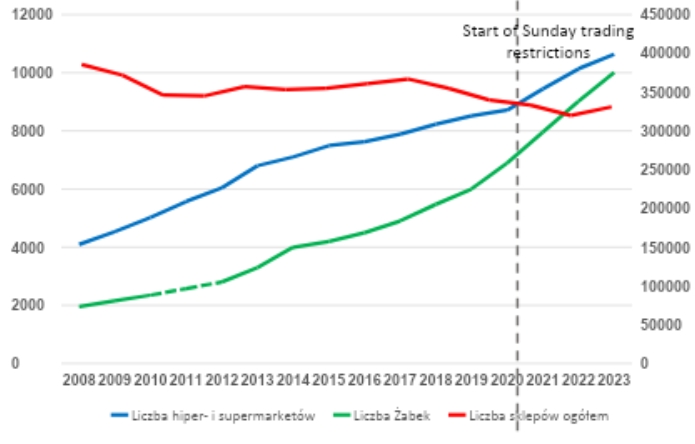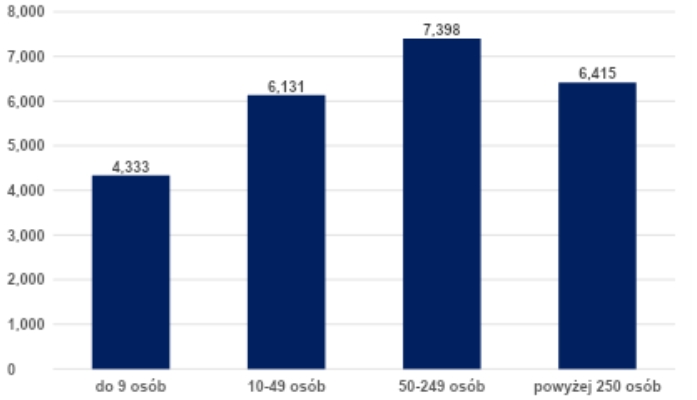The Sunday shopping ban (initially on selected Sundays, later on almost all) has been in force in Poland since 2018. The bill proposed by the Third Way intends to restore trade on the first and third Sundays of each month, in line with the Coalition’s parliamentary campaign promises. Even restoring trade every other Sunday should be regarded as a step in the right direction. The bill was introduced to the Sejm in March and passed its first reading in June. Since then, it has been awaiting review in a committee.
The Civil Development Forum (FOR) has opposed the Sunday shopping ban from the start, highlighting the harmful effects of this measure and the errors in the regulations introducing it.
Consumers and Employees
The current regulations on Sunday shopping restrict consumers’ freedom by removing their ability to choose which day to shop. The state interferes with people’s lifestyles, steering them toward specific choices. In the justification for the Sunday shopping ban, the legislator notes—as something positive—that closing shops on Sundays would shift consumer interest toward visiting restaurants. Thus, the state intervenes not because of a pressing social problem or negative externalities, but to decide how consumers should spend their weekends. This also casts doubt on another alleged objective of the law—caring for employees’ free time. For some reason, working in retail is considered undesirable, while working in gastronomy or entertainment is not.
However, this legal solution is not in the interest of all retail employees. Some workers prefer having the option to work on Sundays, for example, so they can have weekdays off to take care of administrative matters. Some are young people, such as students, who cannot work during the week and are willing to work on weekends.
Even among those who are theoretically the main beneficiaries of the Sunday ban, opinions are divided. According to a UCE Research survey commissioned by Onet, as many as 45% of cashiers oppose the Sunday shopping ban. According to MJCC research, 19% of retail workers overall and 31% of those under 30 years of age oppose the ban, with opposition even stronger in urban areas. Although the survey results differ, they clearly show that even within the group most privileged by the ban, many advocate for restoring the freedom to trade on Sundays.
Support for Small Shops?
Although the Sunday trading ban, as declared by then-Prime Minister Mateusz Morawiecki, was intended to help small shops, it has done nothing to reverse the unfavorable trend (Figure 1).
The number of shops in Poland has been steadily declining over the years, while the number of hypermarkets and supermarkets has been growing dynamically. Their share of the total number of shops in Poland rose from around 1% to around 3% between 2008 and 2022. This phenomenon is not surprising.
However, important in light of the government’s declarations, the introduction of the Sunday shopping ban has not helped small shops nor slowed their decline. Only some franchise chains like Żabka have benefited from the ban, as their stores are typically open on Sundays by taking advantage of statutory exemptions.
It is also important to note that working conditions in large-format stores are, according to reports from the National Labour Inspectorate (PIP) (Table 1), significantly better. As PIP points out, fewer irregularities are generally found in larger enterprises, not only in the retail sector. In the retail sector specifically, during 2022–2023, in seven out of nine categories, significantly more irregularities were found in small businesses than in large-format stores. As the PIP report indicates, irregularities in large businesses affected only a small number of employees, whereas in small shops, they often affected all employees. Similarly, certain employers’ obligations or employees’ rights are more frequently not respected completely in small shops.
Figure 1. Number of hypermarkets and supermarkets, Żabka chain stores (left axis), and total number of stores (right axis) in Poland, 2008–2023

Source: FOR’s own elaboration based on data from Polish Statistical Office (GUS), Żabka Polska, and media reports
Table 1. Labour law violations identified during inspections of retail businesses in 2022–2023
| Category | Percentage of inspected businesses where irregularities were found | |||
| 2022 | 2023 | |||
| Large-format stores | Small-format stores | Large-format stores | Small-format stores | |
| Holiday pay equivalent | 30,0 | 32,4 | 27,3 | 25,0 |
| Granting annual leave in the year the entitlement arises | 24,6 | 22,3 | 26,7 | 20,8 |
| Maintaining personnel records | 20,7 | 51,6 | 25,4 | 58,3 |
| Issuing employment certificates | 19,3 | 34,1 | 18,8 | 43,2 |
| Providing information on certain terms of employment | 17,9 | 46,5 | 24,3 | 51,1 |
| Maintaining records of working time | 17,3 | 42,4 | 24,0 | 42,9 |
| Payment for overtime work | 15,4 | 41,6 | 22,5 | 37,9 |
| Payment of additional remuneration for night work | 9,5 | 15,3 | 0,0 | 22,0 |
| Establishing work schedules | 9,1 | 36,3 | 13,9 | 28,7 |
Source: Report on the activities of the National Labour Inspectorate, 2023
Therefore, the Sunday shopping regulations do not contribute to improving working conditions. In the justification for the act restricting Sunday shopping, attention was drawn to the alleged non-compliance with labour rights by large-format retail chains, which should be considered false when compared with small establishments.
Moreover, employees in large-format stores earn more (Figure 2). According to data from the Polish Statistical Office (GUS), in 2022, the average wages in enterprises in Section G (wholesale and retail trade; repair of motor vehicles) employing more than nine workers were over 50% higher than in enterprises employing up to nine workers. Higher wages and better treatment of employees in large-format stores have also been highlighted by trade unions — the Union Alternative (Związkowa Alternatywa) and its chairman Piotr Szumlewicz, who oppose the Sunday shopping ban and instead advocate for higher pay rates for Sunday work across the entire economy.
Figure 2. Average monthly gross salary per employee in 2022 in enterprises in Section G (wholesale and retail trade; repair of motor vehicles) by enterprise size
Summary
Current regulations banning Sunday shopping infringe on consumers’ freedom of choice, with lawmakers attempting to impose a particular lifestyle. They also force consumers, if they need to shop on Sundays, to pay more for the same goods. Moreover, it constitutes a significant interference with entrepreneurs’ freedom to conduct business activity. Additionally, the regulations favor a specific group of employees (placing retail employees above employees in gastronomy or entertainment), which also harms those retail workers who would like to have the opportunity to work on Sundays. The previous government targeted large-format retail chains while claiming to support small shops, which harms the interests of workers, as larger stores offer better working conditions and higher wages.
The proposal to restore trading on two Sundays per month is insufficient, as there is no valid justification for such a restriction; therefore, trade should be permitted on all Sundays. Nevertheless, this bill represents a step in the right direction toward liberalizing the regulations.
The partial restoration of Sunday trading was included in the program of the Civic Coalition and the Third Way, which now form the governing coalition together with the Left. One can hope that politicians will not forget their promises and will move forward with processing and then passing the proposed bill, especially since this is a pledge that does not burden the state budget and could even bring additional revenue. Thus, the state of public finances or the excessive deficit procedure cannot be used as an excuse for failing to deliver on this promise.




